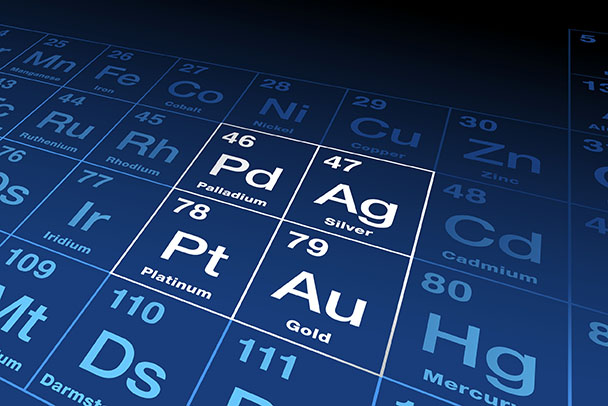

Platinum is a chemical element with the symbol Pt and atomic number 78. It is a dense, malleable, ductile, highly unreactive, precious, silverish-white transition metal. Its name is derived from the Spanish term platina, meaning "little silver".
Platinum is the most resistant of all metals to corrosion, even at high temperatures and in the presence of acids. It is also one of the rarest metals on Earth, making it very valuable.
Platinum is used in a variety of applications, including:
Platinum is a valuable metal with a wide range of uses. It is a safe, durable, and versatile material that is sure to be used for many years to come.
The scientists used platinum catalysts to speed up the chemical reactions.

Noun:
Adjective:
The word "platinum" comes from the Spanish word "platina", which means "little silver".
The word "platina" was first used in English in the 17th century. It was used to refer to a silvery-white metal that was found in South America.
The root of the word "platina" is the Latin word "plata", which means "silver".
So, the word "platinum" literally means "little silver". This is a reference to the fact that platinum is a silvery-white metal that is similar to silver.
What is platinum used for?
Question:
Define platinum and explain its significance in various scientific and industrial applications. Provide examples of its uses in technology and mention any unique properties that make platinum valuable.
Answer:
Platinum is a precious and rare metallic element with the chemical symbol Pt and atomic number 78. It is highly valued for its unique physical and chemical properties, making it indispensable in several scientific and industrial applications. Platinum's exceptional resistance to corrosion, high melting point, and catalytic properties are among its notable characteristics.
Platinum finds widespread use in technology and industry. In catalytic converters, it helps reduce harmful emissions from vehicles by facilitating chemical reactions that convert pollutants into less harmful substances. Platinum is a key component in fuel cells, enabling the conversion of hydrogen and oxygen into electricity, with water as the only byproduct.
The jewellery industry also prizes platinum for its lustre, durability, and hypoallergenic properties. In electronics, platinum is employed in various components due to its excellent conductivity and resistance to oxidation.
Additionally, platinum is crucial in laboratory equipment and scientific research, particularly in analytical chemistry and DNA analysis, where it plays a role in accurate measurements and precise reactions.